
Glass baking dishes are meant to be used both in the oven and in the freezer. They go from the oven to the table to the freezer. Glass baking dishes can do this because they are made to withstand heat and cold. Problems can occur, however, if glass cookware is taken straight from the freezer to the oven. Make sure you're using glassware that's safe for freezer to oven use. That pretty bowl you picked up for serving salad may not be usable.
Glass Bakeware from the Freezer
Glassware should not be placed directly from the freezer into the oven. Although glass baking dishes are designed to withstand both freezing and baking, they are not designed to withstand rapid changes in temperature. Allow the glassware to defrost before cooking the dinner. Place the glassware in the oven when it's cool rather than cold. Try placing the dish in the refrigerator to slowly defrost it, or set it in an inch of warm water to quickly warm the glassware without defrosting the food in it.
Glass Bakeware from the Cupboard
There is no danger in transferring a frozen dinner to a glass baking dish that has been stored at room temperature before cooking. Although the food experiences a rapid temperature change, the glassware does not. This means there is no risk of it breaking in the oven since it is designed to withstand baking temperatures.
Cooking Time and Temperature
Glass cookware allows food to absorb heat faster. A frozen dinner cooks quicker in glass than in metal. Many recipes give instructions for either reducing cooking time or temperature for glass baking dishes. If you don't have instructions, lower the oven temperature by about 25 degrees and check the dinner about 15 minutes before it would have been ready in metal bakeware. Continue checking it every five minutes until the meal is done.
Stovetop Cooking
Glassware should not be used for cooking frozen dinners on the stove top unless it's specifically designed to do so. Not only is the food likely to burn due to uneven heating, but the glass cooking dish could break. If you're in doubt about the glassware's suitability for stove top, oven or freezer use, err on the side of caution and fall back to your tried and true favorite cooking pots.
Related Articles
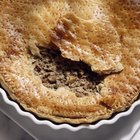
Glass Pie Pan Baking Tips

Is Corning Cookware Safe?

Cooking With Glass Vs. Ceramic
How Do I Know If My TV Dinner Has BPA?
How to Lower Cooking Times & ...

How to Use a Probe Cooking Thermometer

How to Reheat Leftover Pork Chops ...

Cooking Frozen Vs. Defrosted Food

Quick Method for Thawing Frozen Bread ...
Freezing a Dish With Sour Cream in It

Is Revere Ware Aluminum?
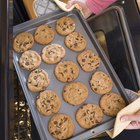
How to Cook Cakes and Biscuits in a ...
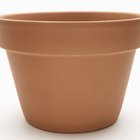
How to Bake Bread in a Clay Pot

The Safety of Refrigerators and ...

How to Cook in Ceramic Bakeware
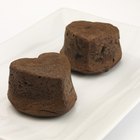
What Is a Souffle Dish?

How to Cook Cake in a Glass Dish
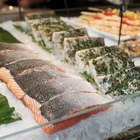
FDA Food Storage Temperature Guidelines

Can I Make a Cake Mix in a Ceramic Dish?

Can I Freeze Unused Cupcake Batter?
References
Photo Credits
Hemera Technologies/Photos.com/Getty Images